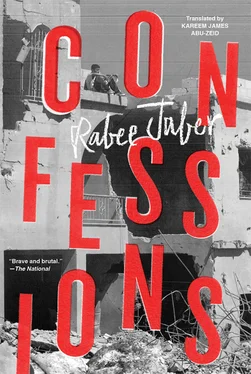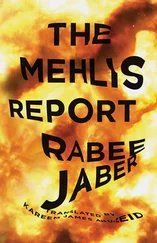MY FATHER used to kidnap people and kill them. My brother says he saw my father transform, during the war, from someone he knew into someone he didn’t know. That’s my big brother — I never knew my little brother. I know his picture, I know his face, he looks more like me than my big brother — that is, in photos he used to look more like me — and I call him my little brother, as all of us used to call him — in our heads, even if we didn’t actually mention him in our conversations, his pictures still filled the house — what was I saying? I call him my little brother even though he isn’t my little brother, and I call him “little” because he stayed that way, because he never grew up, because they killed him when he was a boy.
How many times did I see my sisters sitting silently in the living room (the safe room, our refuge in times of shelling) as if they were at a funeral, side-by-side on the long sofa with the green velvet cover, gazing at the enlarged picture of him on the wall, a black ribbon hanging over the corner of it. How many times did I see my big sister turn, in tears, and watch me enter carrying a sandwich — I ate sandwiches all the time: the shelling died down at sunset and my mother would rush into the kitchen, warning me not to follow her, but I always did. I ate those mortadella and pickle sandwiches as fast as she could make them. I can recall my sister now as if all these years had not passed — they passed and they didn’t — I remember her turning to look at me from beneath her long lashes, her black hair framing her white face, and I remember how she’d raise her eyes and look at the picture…. I can recall the moisture on her lashes, I haven’t forgotten that. I didn’t know at the time — how could I? — that my sisters weren’t able to look at my face without feeling their hearts break, split in two…. To this moment I haven’t forgotten my sister’s face, how it transformed, the love and hate, the confusion and fear and anger. I didn’t understand how her expressions could suddenly appear like that, only to melt away and be replaced by others. How could her face be so transformed in the blink of an eye? Clouds don’t race that quickly across the sky…. What was she feeling when she looked at me and then at the picture? When we passed each other in the corridor, between the living room and the kitchen, my big brother often pushed me in the chest to move me out of his way and I would turn toward him and see the strange expression on his face as he looked back at me: as if the sight of my face was repulsive to him. He’d bare his teeth like a wolf, I didn’t know why…. So much time has passed and yet, even now, I still don’t know how to tell my story. All of this is hard. All these years have gone by and I’m still at a loss, still unable to speak, as if the words themselves were clogging my throat: I can feel them rising from my belly, from my heart. And as I finally speak, it feels like the mud is leaving. But it’s not mud.
This memory is one of my oldest from the house in Achrafieh — it might be from the very last days of the Two-Year War, but I’m not sure of the exact date. But I know it’s from that period — that much I know — from the last part of the Two-Year War, not from ’75, yes, from ’76, I’m sure of that, and not the beginning of ’76, because at the beginning of ’76 I was bedridden, feverish, caught between life and death — I didn’t open my mouth back then, didn’t speak a word. I was saved, a new life was written for me. What I remember from that time — the time of my illness — is dark and strange and fluid. I’ll talk about it later: all of my memories from that first period are jumbled, and I don’t trust them, I don’t know if they’re real or imagined, if they’ve become intertwined with dreams, if they’re stories I later heard from my sisters and my big brother and my mother (my father didn’t speak much). My oldest memory — the oldest one that I know belongs to me, a real memory and not someone else’s invention, not my own invention either — is from the Achrafieh house: my father burning clothes and notebooks in our backyard. I can still see the fire and the wood, the stove made of large stones. I remember the fire was outside the stove, on the ground, where my mother used to set her large washing pot (the electricity went out a lot back then, and my mother and sisters would do the laundry by hand under the peach tree), and I remember my father, his darkened face — he didn’t look like my father — and how his face clouded over while he pulled things — I didn’t know what they were — out of a deep sackcloth and threw them onto the fire, as the tongues of flame leapt to lick his eyelids and the hair on his head. He was inching around the fire, slowly, and I stayed inside by the kitchen table, not moving a muscle, holding my breath while gazing through the open door. Even now I remember my fear. I didn’t know what was happening.
But I have another memory from that period as well, a memory I love and always enjoy calling to mind: all of us were in the family room and the shelling had stopped days earlier, maybe weeks earlier, I can’t be more specific, but the feeling of safety was almost complete, as if there were no threats of the ceasefire being broken at any moment, even though no one trusted the “ceasefires.” No, it actually felt like peacetime, but the war wasn’t over — the Two-Year War hadn’t ended yet. We were sitting there as if the war weren’t happening, as if the war had never even taken place. All of us were in the family room, gathered around the wooden fold-up table as my mother poured hot kishk porridge into bowls. My father cut the bread and passed it around — I remember his big hands and the hair on his fingers, and my brother taking the sliced loaf from him, uncovering it, and placing a piece between him and my little sister — she always sat next to him, on his right. One of my sisters laughed as she watched. My little sister split the piece of bread in two because she didn’t eat much. We were scared she was becoming anemic: she never ate anything — she liked drinking milk but didn’t like eating — all this is part of the same memory: When I recall us sitting together on that distant morning, eating warm kishk and watching the steam rise from our bowls, which were quickly becoming empty, I remember countless details about my sisters, brother, and parents. I remember, for example, the knife in my big sister’s hand as she peeled onions, and how she cut each onion into four pieces to pass around. I remember the basket filled with onions, and how the peels were piling up. Years later, I started having unsettling dreams: I saw that very same scene, but with different faces. I saw a big stove in the middle of the room, and slices of white onion on top of the stove, slices that were turning black over the flame. I saw a loaf of bread being toasted beside the pieces of onion. The entire scene was changing before my eyes: it wasn’t the Achrafieh house anymore, it was a different house. And I saw faces, at once strange and familiar. Who were they? What did the memory mean? All of this — back in that earliest period of my memories — used to torture me. Torture me? That word doesn’t mean what I want it to mean. I was confused and didn’t know why. I didn’t know why the confusion wouldn’t dissipate, why I took such an interest in those incomprehensible dreams.
There’s another memory from that period, this one’s not mixed up with any other memories, this one’s flawless, and dear to me as well: My mother was in the kitchen making sweets for us. It might have been a holiday. She was kneading dough, preparing trays of
Читать дальше












